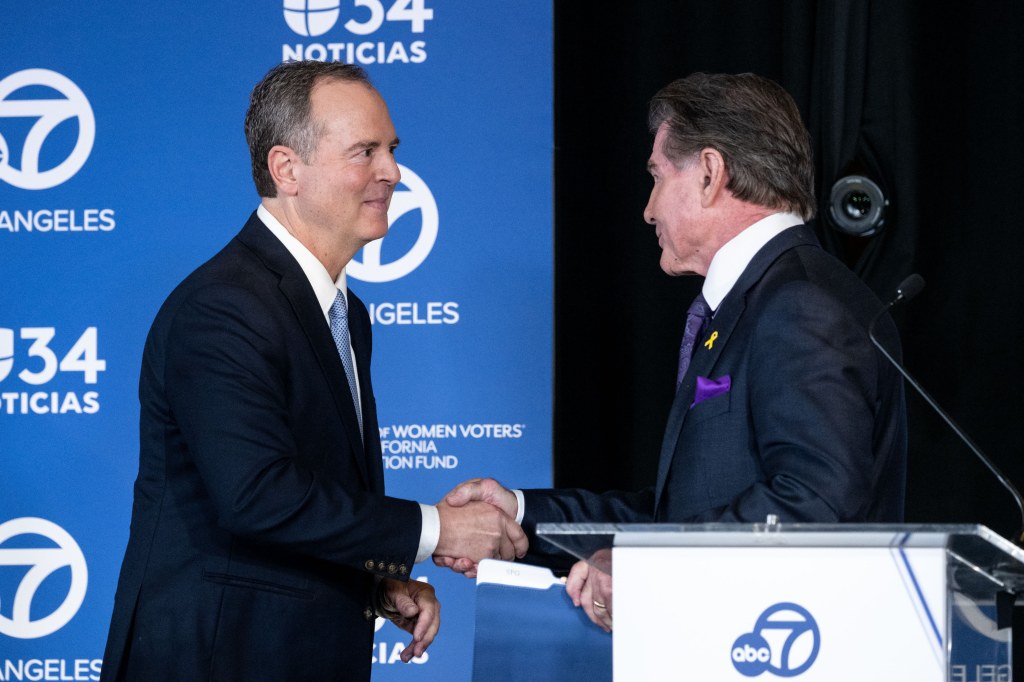
Los Angeles Democratic Rep. Adam Schiff and former baseball star Steve Garvey, a Republican who voted for Donald Trump, emerged from the March primary to be the next U.S. senator from California nearly tied with about 2.3 million votes each. But barring a major upset, Schiff is the clear frontrunner this November in the race to fill the seat former Sen. Dianne Feinstein held for three decades.
“Ever since California turned to a top-two primary system, real action has usually been in the spring, not in the fall,” said political analyst Dan Schnur, who teaches at the University of Southern California and UC Berkeley.
Regardless of the outcome, the Golden State’s two senators are set to be men from Southern California – the winner will join U.S. Sen. Alex Padilla from Los Angeles – after years of being represented by two women from Northern California.
The candidates will appear on the ballot twice, for the six-year term representing California in the upper house of Congress through 2030, and separately to serve out the final weeks of the term left vacant by Feinstein’s death in September 2023. The seat was filled the next month when Gov. Gavin Newsom appointed Laphonza Butler. She chose not to run in the scheduled election.
About 31% of March primary voters chose Schiff, who gained both fans and enemies while running the impeachment proceedings against former President Donald Trump.
Garvey, a former Major League Baseball star with the Los Angeles Dodgers and the San Diego Padres, dipped his toe into politics by entering the race, and also got nearly a third of primary votes.
Democratic voters were split among a competitive field, including Democratic Reps. Barbara Lee and Katie Porter. Porter came in third with about 15% of the votes, and Lee, of Oakland, got nearly 10% of the votes. Now, Schiff is likely to pick up most of those voters as he faces a Republican in the general election.
As of early September, the state has 10.2 million voters registered as Democrats, and 5.5 million registered as Republicans. So it’s little surprise that as November approaches, all signs point to California’s electorate strongly preferring Schiff over Garvey. Recent polling shows Schiff with at least a 20-point lead. And California hasn’t elected a Republican to the U.S. Senate since 1988.
That, Schnur said, means much of the Republican party’s attention is focused elsewhere, not on boosting Garvey’s uphill battle in a famously blue state.
“Both parties only have a finite amount of money to spend on 33 Senate races… Neither one is going to spend a great deal on California.” Schnur said. And with the race’s outcome all but certified in the minds of most experts, even Schiff has focused his attention elsewhere.
After amassing $38.5 million for his campaign, Schiff has been fundraising and campaigning for other Senate races around the country, ones that will determine who his future Capitol Hill colleagues are likely to be and determine the balance of power in Washington, D.C.
“Schiff knows that barring a political earthquake, he’s going to be a senator by this time next month,” Schnur said. “There’s no reason for him not to be building political capital by supporting and campaigning for other Democratic candidates in other parts of the country.”
Despite the steep odds, Garvey has had some recent fundraising success, outraising Schiff in the second quarter of 2024. Overall, though, his campaign has raised just over a quarter of Schiff’s cash.
Regardless, for the first time since 1992, the state will be represented in the U.S. Senate by two men.
Months after Feinstein took office, Barbara Boxer joined the formidable San Francisco Democrat, who died at age 90, to become the first pair of female senators to represent any state. But a lot has changed since then, including the state becoming solidly blue.
“California politics has transformed itself almost completely since the last time this seat was up in 1992,” Schnur said.
Schiff and Garvey reminded voters about the issues they are running on during a televised debate Tuesday, the only debate between the final two candidates, after several leading up to the primary.
The candidates discussed their differing positions on how to address rising housing costs, abortion, immigration and Trump’s presidency, among other things.
Schiff’s general pitch to voters emphasized his experience, his opposition to Trump, and several policies he supports, including tax breaks for renters and supporting a national right to abortion. Garvey focused on criticizing Schiff’s record in Congress, his plans for tougher immigration enforcement at the border and blaming inflation and economic woes on Schiff’s party.
Melissa Michelson, a political science professor at Menlo College, also sees this year’s Senate race as nearly a sure thing for Schiff but is worried about the implications of noncompetitive races on the November ballot. “It’s a shame… in a blue state where the high-profile races are pretty much foregone conclusions, that can mean lower turnout,” Michelson said.
“That can really hurt down-ballot races,” she said, also pointing to the outsize importance of the primaries for races like the Senate race.
“Your vote is so much more powerful in a primary election,” Michelson said. “It’s sometimes the more important election, and yet, the election where folks are less likely to vote, and that’s really a shame, because the whole point of elections is that people should be choosing their representatives.”

















































